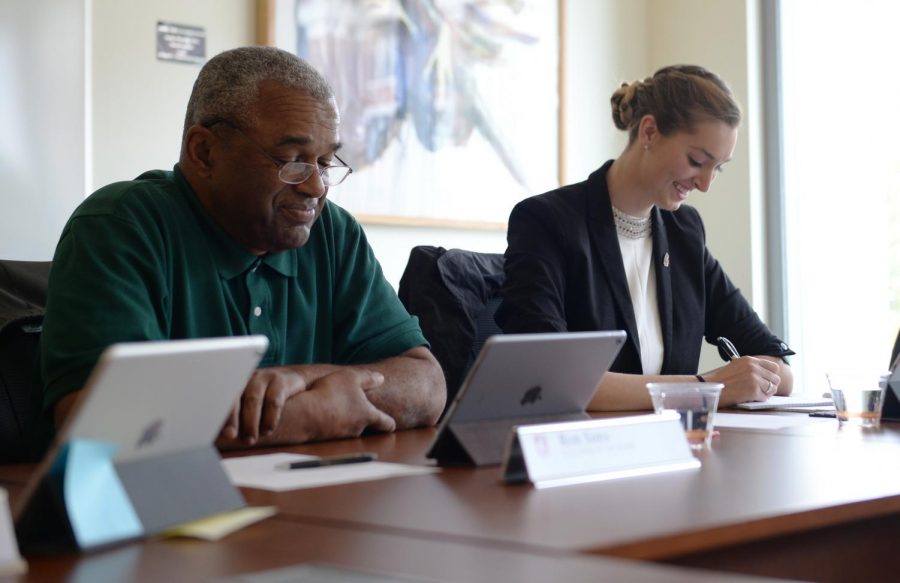Regents approve athletics budget plan
Chun said department will try to work with student body on new fee
MICHAEL LINDER | DAILY EVERGREEN FILE
Ron Sims, left, vice chair of the WSU Board of Regents, and Alyssa Norris, student regent, listen during a Board of Regents meeting last September. The Board of Regents unanimously approved a new athletics budget plan aimed at reducing the department’s multi-million dollar deficit Friday.
June 8, 2018
The WSU Board of Regents unanimously approved all three parts of a new athletics budget plan designed to address the department’s deficit in the coming years during a retreat Friday.
The plan, which relies on student fee revenue more than doubling by fiscal year 2022, was designed to address a more than $60 million deficit facing athletics. The plan also said the department will cease deficit spending or purchasing more than the incoming revenues by fiscal year 2023, but the total athletics deficit will have reached about $84 million by that time.
The three parts of the plan presented in front of the Board for approval included next year’s budget, operating deficit reduction measures and temporary transferring of funding to cover the athletics deficit at the end of the current fiscal year to stay in accordance with state law.
Regent Mike Worthy, who has been on the Board since 2006, said he does not regret the decisions the group made leading up to the current deficit athletics faces.
“There’s a handful of votes I wish I could take back, where I voted in favor of an initiative that didn’t work out,” Worthy said. “None of those were athletics.”
He said he sees the proposed plan as a good path forward.
“I think this is a dramatic and appropriate plan to address these circumstances,” Worthy said.
Director of Athletics Patrick Chun said many students have expressed worry over a new mandatory students sports fee, but Chun ensured the fee would be implemented ethically.
“We have a clearly articulated process that … any student fee has to go through,” he said. “We are not going to circumvent that in any particular form or fashion.”
Chun said the department plans on collaborating with student leadership to garner support and to allow athletics and the student body to work together on a possible new fee. The proposal athletics made to the ASWSU Senate in February failed despite support from then-ASWSU President and future Student Regent Jordan Frost, preventing it from appearing as a referendum on the 2018 ballot.
The fee proposed in February would only have been applied to students attending the Pullman campus, but Chun said the scope of the fee would be an area discussed going forward, as it may be applied to other campus’ students as well.
Another part of the plan emphasized heavily by Chun, Joan King, chief university budget officer, and WSU President Kirk Schulz comes in the form of increased fundraising. The university wants to achieve higher fundraising amounts by fostering better relationships with alumni.
“We had a few donors who gave six-figure gifts to athletics that said ‘this is the first time I had an athletics representative sit down and have dinner with me in like eight years,'” Schulz said. “We’re already seeing that kind of positive impact.”
While Chun said the Cougar Athletic Fund has had recording-breaking donation totals the last two years, athletics looks to hire more staff members to bolster their fundraising efforts, as well as looking to target specific alumni. He also said the department has had the tools to bring in large amounts of donations but the university’s strategy has not been focused enough.
“We have a great team of officers,” Chun said. “We have the team in place, we have just not been strategic or structured.”
On top of fundraising, WSU has also began talking with corporations on sponsorship deals for things such as the naming rights to Martin Stadium as a way to increase revenues, as well as beginning more grassroots efforts in addition to the focus on wealthy alumni.
While athletics has overspent continuously in previous years, Chun said the department runs efficiently but fails to bring in enough money. Athletics expenses in the 2017 fiscal year were the lowest of any Power 5 conference school at 74 percent of the Pac-12 average while revenues over the same period only reached 65 percent of the conference average.
A Washington law prohibits any department in a public university from reporting a deficit at the end of a fiscal year, so WSU will cover the athletics deficit by transferring money from other areas at the end of the fiscal year. King said the school will then give those funds back to each group they borrowed from, using what she called “journal vouchers.”
After athletics ceases deficit spending, the group will then work to build reserves for any unforeseen expenses as well as begin to repay borrowed money.
“We have to build our reserves,” Chun said. “We’ll have to repay those central reserves.”
Schulz said while many want the deficit to decrease as quickly as possible once spending gets out of the red, it is important for athletics to accumulate a reserve to avoid going back into a budget crisis in the case of emergency expenditures.
The Board of Regents also unanimously approved the three other action items on the agenda, which dealt with the financing and implementation of a new human resources system and a statement of commitment to the Elson S. Floyd College of Medicine.
This story will continue to be updated as we gather information.




















